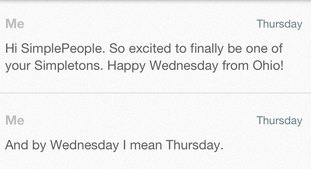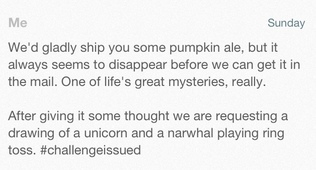 Lately, I have been sifting through an endless stream of posts about the things that influence workplace happiness and theories about what employees really want. From the perks of good coffee to the merits of standing desks to the endless debate about whether open offices are amazing or awful (I tend to be in the latter camp on that one), there are a lot of studies and a lot of opinions floating around.
Lately, I have been sifting through an endless stream of posts about the things that influence workplace happiness and theories about what employees really want. From the perks of good coffee to the merits of standing desks to the endless debate about whether open offices are amazing or awful (I tend to be in the latter camp on that one), there are a lot of studies and a lot of opinions floating around.
Niceties are nice, but at the core, I think this entire conversation is spiraling and sidestepping a much larger reality. We're standing on the edge of a huge and inevitable cultural shift; a shift I believe will have at least as large an impact on American culture as women forgoing stay-at-home motherhood in favor of entering the workforce.
Quality of life is no longer limited to a simple matter of income. For years we've been told to strive for a work/life balance, but people are finally waking up. They're realizing that balance is bullshit, and life shouldn't take a backseat to their jobs. The result? A slow and steady workplace evolution is taking place to match the shifting priorities of the talent companies are looking to hire and keep.
The single value that's driving it all? Autonomy.
This is the part where I tell you I'm clearly biased on this topic. I work for an agency that grants me the ability to work remotely from 500 miles away. They put their full trust in me -- and I do my best to show my gratitude by working hard and doing everything I can to make sure I never give them a reason to doubt our arrangement. (But I'll save the lessons and learnings on remote employment for another post.)
Over the last couple years of remote employment, I have learned it's a topic that currently gives a lot of people (primarily people in leadership positions) serious indigestion. How does that work? How do they know you're doing what you're supposed to be doing? And while there are many parts and pieces to the logistics (from Skype meetings to workflow systems), the crux of those polite inquiries really boils down to this: How can I have a 100% guarantee that a remote employee is doing what they're supposed to be doing?
The bad news is: you can't. The good news? That reality is nothing new or different.
From a recent post on Quartz:
“We have this factory model, and we think someone’s working if they show up in the morning and they’re not drunk, they don’t sleep at their desks, they leave at the right time. But that has so little to do with what you create. And we all know people who create a lot without fitting into those norms.”
Research indicates employees greatly value autonomy. This is part of what’s driving millennials to leave traditional offices and go out on their own. “It’s a cultural phenomenon,” says Alex Abelin, co-founder of Liquid Talent.“Everything is pointing in that direction. We care more about mobility and independence.”
As my dear friend Heather Whaling once said, if you can't trust people to work without you standing over their shoulder, you've hired the wrong people. That's a people problem, not a process problem. So, that nervous feeling you're getting in your gut as you read this? In the wise words of a tundra princess, let it go. That thing you're fighting against is already happening and it's happening fast. You've only got two choices: embrace it and thrive or push back and find yourself way behind the curve five years down the road. (Remember all those people who once claimed the internet was just a fad and email would never catch on? Yeah, nobody wants to be those guys. And nobody wants to work for that company.)
Don't worry. I'm not going to leave you feeling exposed in the harsh light of a new dawn. I've put together a few thoughts on why this is all really a good thing for business:
Remote allows you to tap into a bigger, better bucket of talent. Hiring is hard. Finding that perfect person who is a great cultural fit with the just-right skill set is hard, hard, hard. When you do find that person, the chances they'll live locally are rather slim, which leaves you with a couple options. You can try to woo them and pay for relocation expenses or you can settle for whoever you can find locally.
In many instances, embracing job relocation isn't as simple as saying "yes" to a great offer. The reality of spouses, children and home ownership all factor into the equation for job candidates. And rightfully so, these things often take precedence over a new job.
I do not believe geography should be the determining factor when it comes to new hires. If I'm a client, I don't care where my designer or copywriter sits -- I care about the creative talent they bring to the table. Whether they are bringing it from Baltimore, Bakersfield or Bangladesh makes no difference to me.
By offering employees a more flexible working arrangement -- the ability to work from anywhere -- you open yourself up to welcoming new and stronger talent onto your team. Instead of just hiring people who can get to your office, you're suddenly able to hire people who get you and want to be a part of what you're doing. You're building a better, stronger company, not just a "based-in-wherever" company.
Early adopters will become the winningest brands. Times are changing -- fast. The companies currently getting cultural and technological infrastructure in place to support the forthcoming era of the "mobile workplace" will have first dibs at the best talent. I predict the autonomy offered by the mobile workplace will be a part of the culture of all brands on the Top 100 list within the next few years. Why? Because it's a perk that is going to appeal to top talent. And top talent is what drives the creativity and innovation behind top brands.
More people in more places means more new business opportunities. Your employees are some of your best ambassadors. They're a living, walking, breathing extension of your brand. Whether they're volunteering in the community, chitchatting on a cross-country flight, attending a gallery opening or striking up conversation in the grocery store line, they carrying your brand's message out into the world every day.
Local has become a big thing -- even beyond the riveting land of local kale. Many brands are now placing a high priority on partnering with agencies who have people in their local community. That becomes a problem when all your people are located in one city -- and your client is across the country. A remote workforce expands the number of locations where the message spreads simply by increasing the number of pinpoints your people dot on a map. When you've got team members embedded in Houston, Omaha, Bismarck, Columbus, Portland and Charlotte, you can cover a heck of a lot more local ground. More people in more places = more opportunities to start the local conversations that lead to new business opportunities.
Remote teams reduce overhead costs. The thought of centralized offices going extinct is a big pill for many to swallow. But in reality, as the workforce decentralizes, the expense of retaining and maintaining space for exclusive use is going to make less and less sense. Energy costs will likely continue to climb, and leases in desirable areas will keep rising. With the advent of technologies that allow incoming calls to be seamlessly forwarded to mobile lines, even ease of communication is no longer a compelling argument in defense of a permanent office.
Having said that, the need for employees to gather and meet as a team (or with clients) will endure. If I had a big chunk of change to invest, I go all in with coworking spaces in creative communities. Not only do these spaces provide affordable place to gather and groove, they offer the ability to collaborate and connect with people beyond your team. Win-win-win.
What are your thoughts? When it comes to the remote workplace are you eager to adopt or hesitant to embrace? If you're a remote employee, what do you like about it? If you're an employer, what are the pros and cons in your mind?







